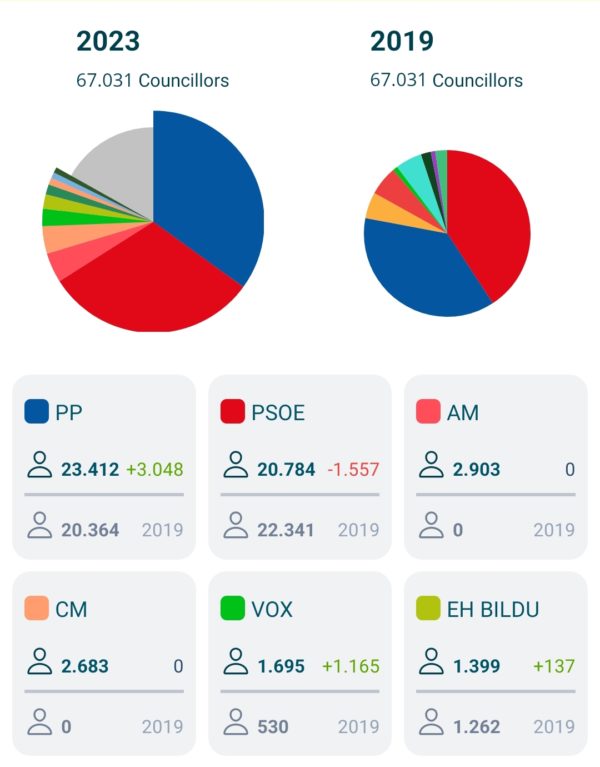In the elections held at the weekend, there is no doubt that the right-wing PP gained strength, but it is also true to say that the left-wing PSOE also increased their number of votes compared to the 2019 elections in many places (reduced overall), and one of the main reasons for these gains appears to be a divergence away from the fragmentation and dilution of the political field we have been seeing for around a decade now, as their increased votes came at the expense of the smaller parties who had been gaining momentum, and have now all but disappeared into the abyss, marking a return to the more traditional political playing field.
However, somewhat bucking the trend, there is one small political group that is still gaining momentum, and at an ever increasing rate, a party which is creeping more into headlines right now, as for many places, the ability to govern by the leading party, in those areas which might be contested, the PP are looking more likely to rely on their collaboration, that is the party named VOX.
Who is VOX? What do they stand for?
The majority of academics in the field, and political commentators, regard VOX as a “far-right” party, something which many in the group deny, claiming to simply be simply more right than the PP and “conservative”. During a party event in Murcia, the party leader Santiago Abascal defined his party as “antifascist, anti-Nazi and anticommunist”. Others consider them “extreme-right”, based on their policies.
VOX was formed in 2013, and officially launched in 2014, as a breakaway party from the PP. The party entered the Spanish parliament for the first time in the April 2019 general election, and became the country’s third-largest political force after the November 2019 Spanish general election, in which it secured 3.6 million votes and 52 seats in the Congress of Deputies.
In these local elections, they secured 1,695 council seats in the municipalities, up threefold from the 530 in 2019, showing how their momentum for growth continues, even with the demise of those other smaller groups.
VOX is a party which stands for Spain, the country, the flag, and the King, and want to bring the perceived traditional values of the Catholic church more to the forefront of society.
Part of their ideology for Spain includes the destruction of the autonomous regions, centralising government. That of course means opposition to separatist movements and calls for independence. They advocate for a single, common language, and so those regions where a unique language is already established, Valencia and Catalonia for example, would have to cease the use and convert entirely to what we would consider the standard form of Spanish. It’s worth noting that these languages are exactly that, languages, not dialects or accents, but actual languages. We are talking of a larger ideology than if the UK reversed devolution and banned people in Wales from speaking Welsh, as an example.
The Catholic church and their values play a big part in their policies. They support only the “traditional” union of a man and woman. They therefore oppose same-sex marriage, they oppose divorce, and they oppose abortion. In fact, VOX were very vocally against the new law which entered into force this week allowing women leave from work in the event of an abortion, the same law which allows for leave for menstrual pain. The PP were also against that law. Many people consider VOX to be anti-feminist. They support the repeal of the gender violence law.
VOX also supports bull fighting and oppose Climate Change laws. They do support the right for individuals to arm themselves. The party leaders, Santiago Abascal and Javier Ortega, are both authorised to carry handguns for self-defence due to recurrent threats to their lives for their political activities.
They also advocate strengthening the borders of Spain, and leaving the Schengen Agreement, thus forcing everybody to show passports at the border. This no longer affects Brits of course, because of the type of Brexit negotiated by the British Government, who could have had Brexit and still maintained membership of Schengen but chose not to. But this puts further barriers for other nationalities.
Immigration is something that VOX wants to control. They want Spain for the Spanish, hence the plan to tighten border control. But of course, for Brits living in Spain, whether we refer to ourselves as “ex-pats” is irrelevant, because we too are immigrants, and therefore might well fall foul of these plans, made worse by some of their members talking openly about expulsions.
It will perhaps come as no surprise having read this brief overview that VOX are supporters of Donald Trump. But this far-right leaning is spreading throughout the continent of Europe. We can see that daily in the rhetoric from the Conservative party in the UK, or at least, part of their almost breakaway group, but the same is being witnessed in France, Italy, Germany, to name but a few.
If you voted PP and the thought of the VOX policies ticks your boxes, then you have the result you hoped for with their coalition. However, if that is not what your ideal world looks like, and although the votes are cast, you can still make your feelings known to your local political representatives.
Sadly, one way or another, Brits are not allowed to vote in the national elections set for July, but we may well then get a clearer picture of how the political field is evolving in Spain, and let us not forget, that although the decision is in the hands of the people, it does not take a majority to make a difference. In Torrevieja, as an example, the PP did far better than previously, obtaining two more council positions, and their overall and undisputed “majority” was achieved with just 15% of the population supporting them.






